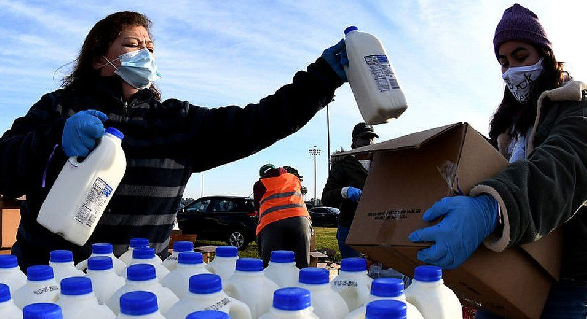
Covid: US Congress passes long-awaited deal for coronavirus aid
The US Congress has passed a long-awaited $900bn (£660bn) package of coronavirus pandemic aid after months of political wrangling.
Senators approved the bill late on Monday, hours after it was passed by the House of Representatives.
The aid includes direct payments for many Americans and support for businesses and unemployment programmes.
The money is to accompany a bigger, $1.4tn spending bill to fund government operations over the next nine months.
President Donald Trump is expected to sign the package into law quickly.
President-elect Joe Biden welcomed the relief package but said Congress needed to get to work to support his Covid-19 relief plan in the new year.
In the House, the bill passed by a vote of 359 to 53 and in the Senate it passed by 92-6.
Many Covid-19 relief programmes were set to expire at the end of the month and about 12 million Americans were at risk of losing access to unemployment benefits.
But some lawmakers said they felt blind-sided by being asked to vote on a mammoth bill without even having a chance to read it.
At nearly 5,600 pages, the legislation was described by the Associated Press news agency as "the longest bill in memory and probably ever".
What is in the package?
The stimulus includes one-off $600 payments to most Americans, and will boost unemployment payments by $300 per week, extending expiration dates for the jobless programmes until the spring.
It also contains more than $300bn in support for businesses, and money for vaccine distribution, schools and tenants facing eviction.
The package includes an extension of an eviction moratorium that was due to expire at the end of this month, leaving tens of millions of Americans at risk of being thrown out of their homes. It contains $25bn in rental aid.
The bill also has a provision to end surprise medical billing - where hospital patients get slapped with fees because they were treated by a doctor who was not covered by their health insurer. President Trump has championed calls to end these stealth fees, which are one of the most unpopular pitfalls of the US healthcare system.
The deal was announced on Sunday by Senate Majority Leader Mitch McConnell, a Republican. Speaking on Monday ahead of the vote, he said: "None of us think this legislation is perfect, but a big bipartisan majority of us recognise the incredible amount of good it will do when we send it to the president's desk. The American people have waited long enough."
House Speaker Nancy Pelosi and Senate Minority Leader Chuck Schumer, both Democrats, said the package delivered "urgently needed funds to save the lives and livelihoods of the American people as the virus accelerates".
